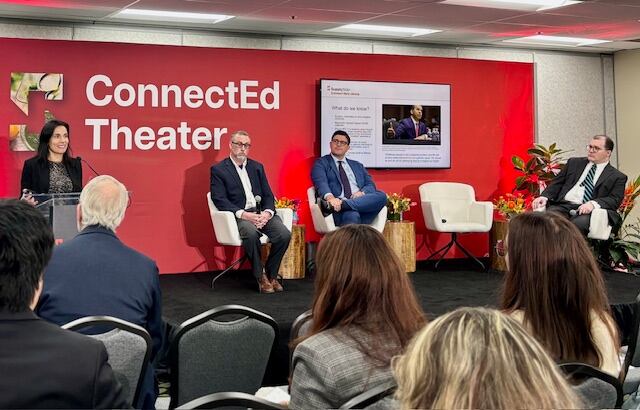The panel featured Rend Al-Mondhiry, co-chair of Amin Wasserman Gurnani LLP’s Regulatory Practice Group, Kyle Turk, director of government affairs at the Natural Products Association (NPA), and Robert Marriott, director of regulatory affairs for the American Herbal Products Association (AHPA).
Al-Mondhiry noted the frenzied regulatory activities, including the 100+ executive orders issued this year, mixed messages from the ‘Make America Healthy Again’ commission and the on-again-off-again tariffs, which have led to a range of emotions among the industry leaders.
“I think, kind of how we’re all feeling at any given time, confused, befuddled, you know, just trying to figure out what does all of this activity mean? Hopefully we can help get to the bottom of some of this, but I think it is early to tell and there’s going to be a lot more to decipher over the next few months,” Al-Mondhiry said.
Defining UPF
One point she noted was MAHA’s focus on ultra-processed foods. Health Secretary Robert F. Kennedy Jr. has discussed the removal of “food additives and chemicals” and the reduction of “the dominance of ultra-processed foods” as priorities. But as Al-Mondhiry noted, ultra-processed foods have yet to be defined, given the lack of regulatory or scientific consensus.
“What’s interesting, if you look at dietary supplements, those are pretty highly processed, right? And could those be considered an ultra-processed food potentially,” she asked. “Obviously, there’s a lot of opportunity within this administration, a recognition that there’s different ways to look at a treatment of disease, additional ways to look at how to improve the health of the nation, including children.”
“And certainly it seems like there’s a role for dietary supplements in there, but when you also look at the message of rallying against food chemicals and ultra-processed foods, where do dietary supplements fit into all of that? That’s a big question for me and something I think the industry needs to vigilantly watch,” she added.
Opportunity
Kyle Turk, director of government affairs at the Natural Products Association (NPA), focused more on the opportunities the new administration presents for the dietary supplement industry.
“One of the things Secretary Kennedy has talked about is direct-to-consumer advertising for pharmaceuticals,” he said.
“Frankly speaking, a lot of our industry stakeholders aren’t able to make the same communications to consumers despite research and development that goes into bringing world-class products to the market. If they’re going to continue to talk about direct-to-consumer, that opens up an opportunity for us to work with both the administration and Congress to say, ‘Hey, how do we expand claims for our products?’ because for so long, the pharmaceutical industry has had a stranglehold on how they can communicate with consumers.”
Turk added that tariffs and Congress’s goal to bring manufacturing back to the United States presents a “can’t-miss opportunity for all of us to be a part of the conversation.”
“Whether it’s talking about tax incentives, depreciation expenses being wiped off, there are a number of different avenues that we can take from a congressional standpoint to have our message heard when it comes to how we bring manufacturing back to the United States and really strengthening the supply chain,” Turk said. “HSA FSAs…this is a can’t miss opportunity for us. I think we’ll have one crack at this when it comes to reconciliation of the budget.”
STRIPED
One challenge that Turk highlighted for the industry is the state-led bills. He said a big part of the problem is widespread mistrust on both sides of the aisle.
“States are killing us, both from the food additive side and then from the sports nutrition side,” he said. “I’ll tell you the realities right now: There’s a distrust in the FDA from democrats—and republicans.”
AHPA’s Marriott covered several top level items pertaining to state-led initiatives to limit dietary supplements. He credited much of the activity to Harvard’s Strategic Training Initiative for the Prevention of Eating Disorders (STRIPED).
“They [STRIPED] are strong at introducing bills, and they’re very good at media and hearing work through their youth corps, but they’ve been very weak at moving bills across the finish line,” he said. “Once something is introduced, they don’t always pay as much attention. They’ve struggled with making revisions to the bills to accommodate practical concerns, and of course, they’re not really willing to compromise with the industry.”
Marriott pointed to the New York bill that passed last October that did go into effect, but he said thankfully is not being enforced.
There are also several bills currently active, but Marriott said the one that he’s really watching is Illinois House Bill 3027. The bill aims to prohibit the sale of supplements for weight management or muscle building to those under 18 without a prescription.
“The Consumer Healthcare Products Association (CHPA) got a number of provisions removed from that bill, so it’s not as severe, but Illinois is a deep blue state, they didn’t even hear opposing witnesses in the first hearing of this bill,” he said.
“It’s very likely that this bill will move into law unless something dramatic changes, but the key point here is that we’re going to have to continue to worry about different states implementing different versions of these bills covering different products of unusual, irregular and difficult to predict requirements for these products across different states. And even if you’re not in the sports nutrition space, there’s a decent chance that at least one of the units will wind up covering at least some of their products.”
Red or blue, no state is safe
While blue states have typically been more prone to passing bills to restrict dietary supplements, Marriott said the current regulatory landscape is more frightening now, given red states have started following suit too.
“The thing that makes this a crisis is that this is an unusual moment of cross-aisle view. Historically, we’ve had to worry about crunchy, brutal, liberal states introducing these kinds of bills,” he said. “The state where we are most likely to see another major bill that’s going to affect dietary supplements is Texas, Senate Bill 25, which passed the Senate unanimously. In Texas, a food additive restriction bill. What planet are we on?”
Beyond Texas, Marriott listed several restrictive bills in states like West Virginia and Louisiana.
Advocacy must come into play
In the final stretch of the discussion, the panelists emphasized the challenging environment and the need for the industry to remain vigilant and continue fighting various measures in order to prevent a patchwork of state-level regulations that could significantly impact supplement businesses.
“This is a time of unprecedented uncertainty and chaos for many reasons,” Marriott said. “The dietary supplement marketplace is one small corner of that chaos, but by communicating with each other and organizing and taking a consistent approach in how we regulate ourselves, we can become a place of order that will last through this process.”
Al-Mondhiry said companies cannot be complacent when it comes to self-regulation, especially now.
“Even during a time of uncertainty, the pendulum typically always swings back, so I don’t think it’s time to neglect compliance and what you can do to continue to build consumer’s trust,” she said.
“I think consumers are getting a lot of mixed messages around products and the benefits or negative implications, so it’s time to really look carefully at the science that you’re using to back your studies, make sure it’s sufficient, make sure your products are safe and not to get complacent with any of those.”
The panelists also highlighted the importance of industry collaboration, outreach to legislators and proactively addressing concerns before they escalate.
“This is where the importance of being involved in trade associations and more importantly, advocacy come into play here,” Turk said. “We have a fly-in day on May 8. We’re going to be meeting with congressional leaders from across the country to not only educate them on the investment that members are putting into their products, but also to all the policy opportunities that we have to play into this 119th congress.”




